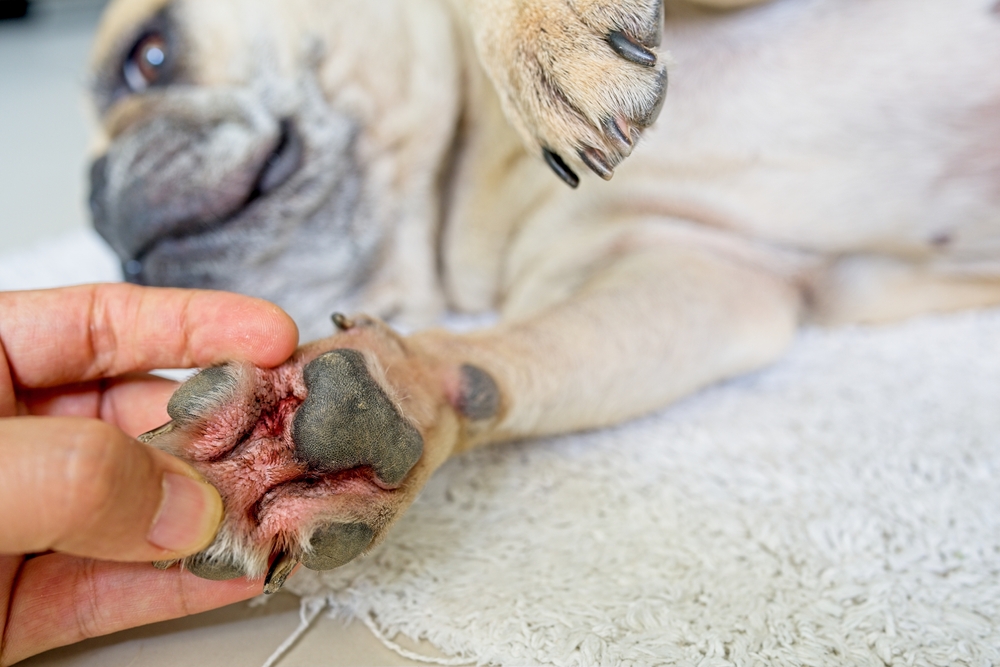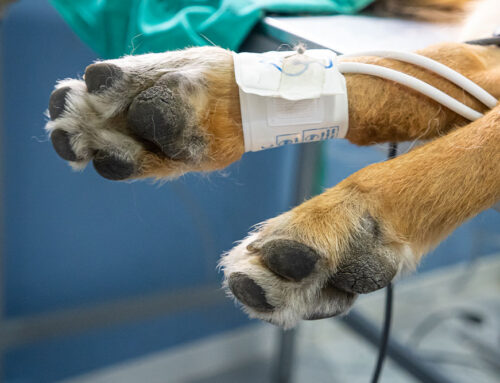If you are an allergy sufferer, this time of year can be challenging because of your itchy eyes, sneezing, and nasal discharge. Like you, your pet can also be allergic to various substances, including pollen, grasses, fleas, and food. Unlike people, allergies in pets do not always manifest as respiratory illnesses, but they still negatively impact your pet’s health. Our Krichel Animal Hospital team informs you of pet allergy causes, signs, and treatment options, so you can help your furry pal feel their best.
Is my pet allergic?
Recognizing allergy signs in your pet is the first step toward the relief and care they need. Common allergy signs in cats and dogs include:
- Excessive scratching and licking — One of the most noticeable pet allergy signs is excessive scratching and licking. A pet who is constantly scratching their skin or licking their paws is likely suffering with an allergic reaction.
- Skin irritation and redness — Allergic reactions in pets often cause skin irritation that manifests as red, inflamed, and sometimes raised patches on your pet’s skin, particularly on their paws, ears, belly, and groin.
- Ear infections — If your pet frequently shakes their head or scratches their ears, that likely indicates an allergic response or other ear issue. Ear infections cause redness, swelling, odor, pain, and discharge. Visit our Krichel Animal Hospital team so we can treat your pet’s infected ears, alleviate their pain and discomfort, and avoid possible inner ear damage.
- Watery eyes and sneezing — Occasionally, allergies can affect your pet’s respiratory system, particularly if their allergies are environmental. If your pet has watery eyes, sneezes frequently, or displays other nasal congestion signs, they likely are allergic to a substance, such as pollen or dust, in their environment.
- Vomiting and diarrhea — In some cases, allergies cause gastrointestinal issues in pets. Vomiting, diarrhea, and other digestive disturbances can occur, especially if they ingest the allergen (e.g., a food allergy).
- Hair loss and hot spots — Allergic reactions can cause hair loss and the development of hot spots or rashes. Hot spots are areas of irritated, moist skin that can become infected if not treated promptly.
- Behavior changes — Allergies can be painful and uncomfortable for your pet so, naturally, their demeanor may change. Discomfort and pain related to allergies may manifest as lethargy, irritability, anxiety, or unusual aggression.
- Seasonal patterns — Some pets develop seasonal allergies that flare up only during certain times of the year. Pay attention to any patterns or changes in your pet’s reactions, which can help identify potential allergens when they are most apparent.
Causes of allergies in pets

Some pets are allergic to one specific allergen only, while others may have many triggers. Primary allergy causes in pets include:
- Fleas — A reaction to flea saliva is one of the most common pet allergies and can be triggered by a single flea bite. Sensitive pets can suffer a severe reaction, known as flea allergy dermatitis (FAD).
- Food and medication — An estimated 10% of allergic pets are reacting to certain ingredients in their food, such as beef, chicken, dairy, wheat, or soy. Some pets are also allergic to specific medications, which can lead to a severe, sometimes life-threatening, reaction.
- Environmental allergens — Pollen, mold, dust mites, grasses, and other environmental substances can cause allergic reactions with itching, scratching, sneezing, and watery eyes.
- Contact allergens — Pets can be allergic to household items they encounter, such as dyes in rugs and fabrics, laundry detergents, and cleaning and grooming products.
- Parasites — In addition to fleas, pets can be allergic to bites from other insects, such as mosquitoes, spiders, ticks, and mites.
- Genetics — Some breeds are genetically predisposed to allergies.
Because your pet may be allergic to several substances, it’s essential that you work with our veterinary team to determine the specific causes. We may perform allergy testing, including blood and skin tests, so we can accurately diagnose the allergen(s) and develop an individualized treatment plan for your four-legged friend.
If you are concerned that your pet may have allergies, don’t hesitate to call our Krichel Animal Hospital team for allergy testing. We do not want your pet to keep suffering.







Leave A Comment